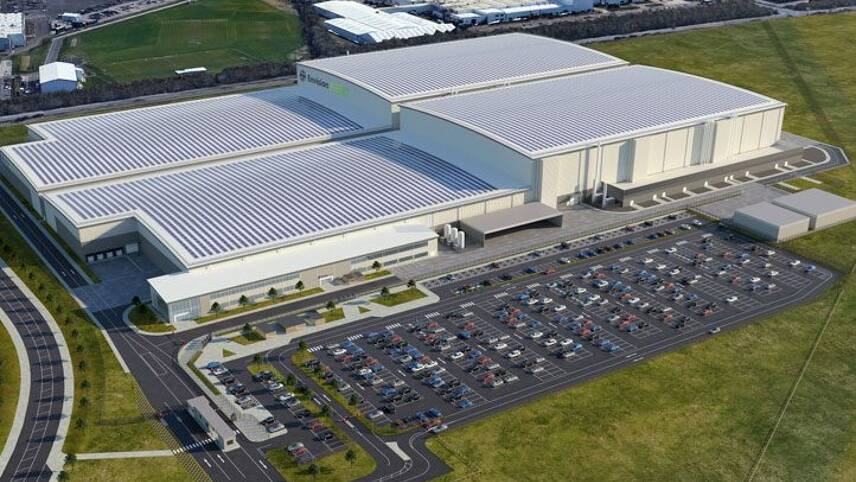Register for free and continue reading
Join our growing army of changemakers and get unlimited access to our premium content

The Nissan EV36Zero EV hub has been launched through an initial £1bn investment by Nissan and its battery technology partner Envision AESC with support from Sunderland City Council. The “hub” combines EV manufacturing, optimised renewable energy use and large-scale battery production to drive low-carbon innovation.
Nissan will invest up to £423m to produce a next-generation EV in the UK, while Envision AESC will invest £450m into what will be the UK’s first gigafactory, located adjacent to the Nissan plant in the International Advanced Manufacturing Park (IAMP). The gigafactory will be powered by renewable energy.
Envision AESC currently operates an existing battery plant in Sunderland, which was established in 2012. Planning process will now begin for the new gigafactory, which will initially act as a 9GWh plant. Envision AESC has agreed to a potential future-phase investment worth £1.8bn, which would boost the plant’s generating capabilities up to 25GWh, with a further 10GWh being explored.
The new gigafactory will create 750 new jobs and safeguard 300 existing employees. Future plans could see up to 4,500 green jobs created in the region by 2030. No date has been given as to when the plant will become operational.
UK Prime Minister Boris Johnson said: “Nissan’s announcement to build its new-generation all-electric vehicle in Sunderland, alongside a new gigafactory from Envision-AESC, is a major vote of confidence in the UK and our highly skilled workers in the North East. Building on over 30 years of history in the area, this is a pivotal moment in our electric vehicle revolution and securing its future for decades to come.
“Commitments like these exemplify our ability to create hundreds of green jobs and boost British industry, whilst also allowing people to travel in an affordable and sustainable way so we can eliminate our contributions to climate change.”
EV charge up
Currently, production at the Sunderland plant accounts for the Nissan Qashqai, Juke and LEAF EVs. Around 70% of these vehicles are exported to mainland Europe.
The new EV hub accounts for 6,200 jobs at Nissan and its UK suppliers, with more than 900 Nissan jobs set to be created. The plant will be upgraded to optimise energy consumption and manufacturing, while the gigafactory looks set to provide batteries to power up to 100,000 Nissan EVs annually.
Nissan’s investment into the Sunderland facilities has now surpassed £5bn.
Earlier this year, Nissan confirmed a £52m investment into the Sunderland facility that will enable the use of recycled and lightweight aluminium for the production of Qashqai vehicles to reduce the energy required for material processing.
Nissan states that recycling the scrap metal will save more than 90% of the energy needed to create an equivalent amount from raw materials. The new closed-loop recycling system will reduce waste and carbon emissions and build towards Nissan’s goal of achieving carbon neutrality across the company’s operations and the life cycle of its products by 2050.
Additionally, Nissan looks set to add a new solar farm at its Sunderland Plant. The automaker applied for planning permission for a 20MW solar farm at the plant, which is the UK’s largest single car manufacturing facility, following a community consultation.
The plant is already co-located with a 6.6MW onshore wind farm with ten turbines and a 4.75MW solar farm, if the new solar farm is approved, it will be able to meet 20% of its electricity needs with self-generated renewables.
Nissan’s president and chief executive Makoto Uchida said: “This project comes as part of Nissan’s pioneering efforts to achieve carbon neutrality throughout the entire lifecycle of our products. Our comprehensive approach includes not only the development and production of EVs, but also the use of onboard batteries as energy storage and their reuse for secondary purposes.
“Our announcement today comes out of lengthy discussions held within our teams, and will greatly accelerate our efforts in Europe to achieve carbon neutrality. The experience and know-how gained through the project announced today will be shared globally, enhancing Nissan’s global competitiveness. Nissan will continue to leverage its strengths in electrification to become a company that continues to provide value to its customers and society.”
Local benefits
The gigafactory will provide additional regional benefits. Sunderland City Council will lead on a project that places the plant at the heart of a new microgrid. The Council will aim to deliver 100% renewable electricity across this grid, which is expected to reduce carbon emissions in the area by 55,000 tonnes annually.
The Council estimates that up to ten solar farms could be created across the microgrid, including those owned by Nissan, with an anticipated 132MW in generation. This clean power would primarily support businesses located in the IAMP.
The microgrid project also includes plans for a 1MW battery storage system using second-life Nissan batteries.
The Government “is committed to securing investment in gigafactories in the UK” and states that the industry needs “a robust battery supply chain to realise our ambitions of making the electric vehicles of the future here in the UK”.
A 30 GWh Gigafactory has been proposed by manufacturer Britishvolt. The firm confirmed this summer that it has shortlisted two potential sites for the facility, both located in Wales. Its preferred plot is in Bro Tathan, South Wales. Britishvolt has said it will require 80 hectares of land for the facility, given that it wishes to co-locate it with a new solar farm.
Elsewhere, Coventry City Council has partnered with a local airport to develop plans for a major battery Gigafactory that would help to scale up the local EV and energy sectors.
Matt Mace


Please login or Register to leave a comment.